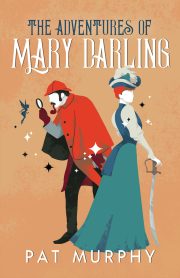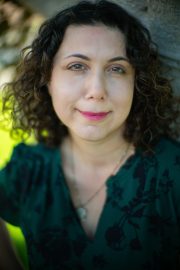Guest Post: Why Go to the Museum?
by Theodora Goss
 It seems a silly question. We go to the museum to look at art, to learn about it, to gain pleasure from it. But I think going to the museum is particularly important for writers. It’s part of a writer’s training, in a sense, to experience as much as possible and to store what is experienced away, not as though doing research, but storing it in the mind so that what is most important is retained. The sheen on a particular piece of glass, for example. Because we create a sense of reality by describing our fantasies as though they were real, and in order to do that we need to draw from what is real, from our experiences. That’s why monsters are hybrids: we always draw from and recombine reality, and so our fantastical creatures are recombinations.
It seems a silly question. We go to the museum to look at art, to learn about it, to gain pleasure from it. But I think going to the museum is particularly important for writers. It’s part of a writer’s training, in a sense, to experience as much as possible and to store what is experienced away, not as though doing research, but storing it in the mind so that what is most important is retained. The sheen on a particular piece of glass, for example. Because we create a sense of reality by describing our fantasies as though they were real, and in order to do that we need to draw from what is real, from our experiences. That’s why monsters are hybrids: we always draw from and recombine reality, and so our fantastical creatures are recombinations.
But in order to do that, in order to describe our fantasies as precisely as possible, we need to have experienced reality widely and fully, and to (this is where it’s not like research) have incorporated it into ourselves. The sheen of that glass needs to become a part of me, a part of my mental equipment so that when I describe a vase in Mother Night’s house, the image comes to me naturally. I write this because when we teach writing workshops, we talk so often about technique, about what the writer should do on paper. But part of being a writer involves working on the self. It involves filling the self with sights and sounds and smells, going to the museum, to the theater, to other countries, trying strange foods. And it involves doing those things consciously, paying attention.
Every fall, I teach my students Walter Pater’s Conclusion to Studies in the Renaissance. What I’m talking about here is not so different from what Pater is talking about: he says that we need to experience each moment fully, to live with a certain passionate intensity that involves continual curiosity, observation. Of course, Pater wants us to do so because someday we will die – we are all condemned to death but with an indefinite reprieve, as he tells us – and he wants us to burn with the famous “gemlike flame,” to come as close to eternity as mortal beings can by living, fully living, every moment. My argument here is more instrumental: the writer should live fully, intensely, experiencing art, food, customs and beliefs, in order to create convincing dreams and visions. So that we can participate in the activity of creation, which is in the end a sort of collaborative activity (Vincent Van Gogh and Henry James both help me, for example), and which is, I believe, the activity that makes us most fully human.
Theodora Goss was born in Hungary and spent her childhood in various European countries before her family moved to the United States. Although she grew up on the classics of English literature, her writing has been influenced by an Eastern European literary tradition in which the boundaries between realism and the fantastic are often ambiguous. Her publications include the short story collection In the Forest of Forgetting (2006); Interfictions (2007), a short story anthology coedited with Delia Sherman; and Voices from Fairyland (2008), a poetry anthology with critical essays and a selection of her own poems. She has been a finalist for the Nebula, Crawford, and Mythopoeic Awards, as well as on the Tiptree Award Honor List, and has won the World Fantasy and Rhysling Awards. This post originally appeared at theodoragoss.com.


